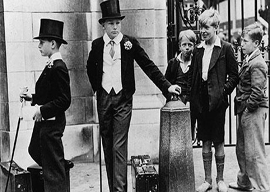
April 12, 2011

The British government is planning to nationalize social mobility as part of something involving “fairness” and government programs. This is sinister because “social mobility,” or “getting on in the world” as we ordinary folk call it, always depended on the intelligence and work of those who were getting on. It was a game played within rules”some admirable, some possibly deplorable. The mobile individual “stood out from the crowd” partly by exhibiting striking qualities not found among others. Intelligence was important, but being engaging (or perhaps “sucking up”) may also have played some part. We do not live in a perfect world, and getting on may require the odd vice as well as conspicuous virtues.
Further, getting on was competitive. One’s mobility could go up or down. The successful benefited at the expense of those who had to settle for something less than power and prestige. It is important to keep these “losers” in view, because one theory of why England pioneered the industrial revolution points to the likelihood that eighteenth-century England had higher rates of literacy than elsewhere. This apparently happened because the better-off had more children than the lower classes, and some of them were thus necessarily “downwardly mobile.” In this lower station, they raised the tone throughout society.
The nationalization of social mobility is sinister because top-down power is invading a whole new sphere of individual endeavor. It is one new push of welfarist regulation into the ever-diminishing area of individual moral agency in our society. The state has already taken over responsibility for paying our medical bills, educating our children, keeping our money in reserve for a rainy day (unemployment, disability, single pregnancy, etc.) when we may need it. All of these moves are a sinister attack on basic virtues, especially those of responsibility, endurance, and thrift. The state is telling us that it wants to determine exactly who should get on. It is unavoidable to include some from good schools and “privileged” backgrounds, but also a certain fixed proportion of those from lower social classes, as measured by the take-up of school meals, will be enabled to get on as well. Individual moral vitality is thus further being subsumed into the world of quotas and targets.
Such a plan destroys one basic character that the upwardly mobile had in the past: a certain rejection of the moral standards of their peers, the world in which, as Allison Pearson put it in the Daily Telegraph of April 6, “to hand in homework is social death.” Modern teaching ideologies and the increasingly powerful diffusion of peer-group attitudes (facilitated by technologies such as computers and cell phones) have long combined to turn some state schools into caricatures of educational institutions. Many are merely inefficient devices for keeping the young off the streets. In past times, however, the upwardly mobile were not only smart, but independent. The new respectable “Cleggies” who will be fed social mobility on a plate will be toadies. And what could be more pleasing to governments?